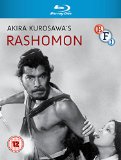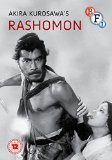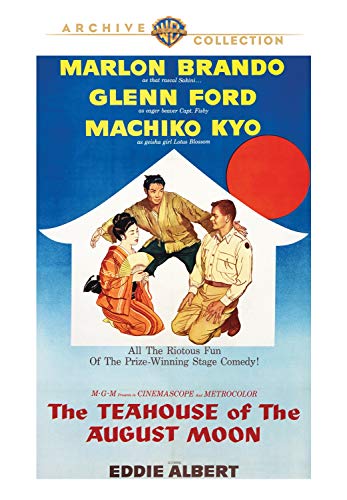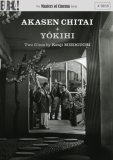 (DVD & BLU-RAY DUAL FORMAT)](/pictures/1117548.jpg) FLOATING WEEDS | Blu Ray | (03/12/2012)
from £N/A
| Saving you £N/A (N/A%)
| RRP
FLOATING WEEDS | Blu Ray | (03/12/2012)
from £N/A
| Saving you £N/A (N/A%)
| RRP Towards the end of his career, Japanese master Yasujiro Ozu (Tokyo Story; Late Spring; Early Summer; An Autumn Afternoon; Good Morning) returned to a story he had made some 25 years earlier as a silent, Ukigusa monogatari [A Story of Floating Weeds], for a magnificent colour reworking, photographed by legendary cinematographer Kazuo Miyagawa (Rashomon, Ugetsu monogatari).When a travelling theatre troupe brings their show to a seaside port, Komajuro (Ganjiro Nakamura), an ageing actor, is reunited with his former lover, sake bar owner Oyoshi (Haruko Sugimura), and his illegitimate son Kiyoshi (Hiroshi Kawaguchi), to the distress of his current mistress Sumiko (Machiko Kyo).From this simple scenario, Ozu builds, one exquisite image at a time, a saga of profound humanity and rich understanding. Encompassing a novelistic range of emotions and tones with the utmost delicacy, Floating Weeds stands tall even amidst a body of work as extraordinary as Ozu's. Making its worldwide Blu-ray debut, The Masters of Cinema Series is proud to present Floating Weeds in a beautiful new high-definition restoration.
![Rashomon [1950]](/pictures/1078426.jpg) Rashomon | DVD | (13/10/2008)
from £20.00
| Saving you £-0.01 (N/A%)
| RRP
Rashomon | DVD | (13/10/2008)
from £20.00
| Saving you £-0.01 (N/A%)
| RRP Famously, Rashomon - which won both the Golden Lion in Venice and the Oscar for Foreign-Language Film - introduced Western audiences to Japanese cinema in general and to the thrilling artistry of Akira Kurosawa in particular.
 Rashomon (Blu-ray) | Blu Ray | (17/04/2019)
from £8.99
| Saving you £11.00 (122.36%)
| RRP
Rashomon (Blu-ray) | Blu Ray | (17/04/2019)
from £8.99
| Saving you £11.00 (122.36%)
| RRP This 1950 film by Akira Kurosawa is more than a classic: it's a cinematic archetype that has served as a template for many a film since. (Rashomon's most direct influence was on a Western remake, The Outrage, starring Paul Newman and directed by Martin Ritt.) In essence, the facts surrounding a rape and murder are told from four different and contradictory points of view, suggesting the nature of truth is something less than absolute. The cast, headed by Kurosawa's favourite actor, Toshiro Mifune, is superb. --Tom Keogh
![Ugetsu [4K UHD + Blu-Ray] (Criterion Collection)](/pictures/1168350.jpg) Ugetsu | Blu Ray | (19/05/2025)
from £19.99
| Saving you £N/A (N/A%)
| RRP
Ugetsu | Blu Ray | (19/05/2025)
from £19.99
| Saving you £N/A (N/A%)
| RRP By the time he made Ugetsu, Kenji Mizoguchi was already an elder statesman of Japanese cinema, fiercely revered by Akira Kurosawa and other directors of a younger generation
![GATE OF HELL [JIGOKUMON] (Masters of Cinema) (DVD & BLU-RAY DUAL FORMAT)](/pictures/1117546.jpg) GATE OF HELL | Blu Ray | (03/12/2012)
from £10.75
| Saving you £9.24 (85.95%)
| RRP
GATE OF HELL | Blu Ray | (03/12/2012)
from £10.75
| Saving you £9.24 (85.95%)
| RRP One of the key works of the early 1950s wave of Japanese films to first reach foreign markets, director Kinugasa's sumptuous period drama astonished audiences with its dramatic force and spectacular colour cinematography.During feudal unrest in the 12th century, samurai warrior Morit (Kazuo Hasegawa) manages to thwart a palace rebellion and save the life of the empress, using loyal subject Lady Kesa (Machiko Ky ) as a decoy. When Morit is offered anything he should desire as reward, he requests Kesa's hand in marriage. Informed that she is already married to a fellow samurai (Isao Yamagata), he refuses to withdraw his request, setting in motion a tragic chain of events.Three decades after the director's iconic A Page of Madness, Kinugasa's striking tale of feudal intrigue, political machinations, and erotic obsession won the Grand Prix at Cannes, two Academy Awards for Best Foreign Language Film and Costume Design, and has since been named by Martin Scorsese as one of the ten greatest colour achievements in world cinema. Gate of Hell's blazing palette is proudly presented afresh by The Masters of Cinema Series in a magnificent new restoration.
 Rashomon (DVD) | DVD | (21/09/2015)
from £18.48
| Saving you £3.27 (19.56%)
| RRP
Rashomon (DVD) | DVD | (21/09/2015)
from £18.48
| Saving you £3.27 (19.56%)
| RRP This 1950 film by Akira Kurosawa is more than a classic: it's a cinematic archetype that has served as a template for many a film since. (Rashomon's most direct influence was on a Western remake, The Outrage, starring Paul Newman and directed by Martin Ritt.) In essence, the facts surrounding a rape and murder are told from four different and contradictory points of view, suggesting the nature of truth is something less than absolute. The cast, headed by Kurosawa's favourite actor, Toshiro Mifune, is superb. --Tom Keogh
![Ugetsu (1953) [The Criterion Collection] [Blu-ray]](/pictures/1148734.jpg) Ugetsu (1953) | Blu Ray | (04/03/2019)
from £32.98
| Saving you £N/A (N/A%)
| RRP
Ugetsu (1953) | Blu Ray | (04/03/2019)
from £32.98
| Saving you £N/A (N/A%)
| RRP Kenji Mizoguchi's tragic ghost story, one of the indisputable classics of world cinema. Having refined his craft in the silent era, Kenji Mizoguchi (Sansho the Bailiff) was an elder statesman of Japanese cinemafiercely revered by Akira Kurosawa and other younger directors by the time he made Ugetsu. And with this exquisite ghost story, a fatalistic wartime tragedy derived from stories by Akinari Ueda and Guy de Maupassant, he created a touchstone of his art, his long takes and sweeping camera guiding the viewer through a delirious narrative about two villagers whose pursuit of fame and fortune leads them far astray from their loyal wives. Moving between the terrestrial and the otherworldly, Ugetsu reveals essential truths about the ravages of war, the plight of women, and the pride of men. Features: New 4K digital restoration undertaken by The Film Foundation, with uncompressed monaural soundtrack Audio commentary by filmmaker, critic, and festival programmer Tony Rayns Kenji Mizoguchi: The Life of a Film Director (1975), a 150minute documentary by Kaneto Shindo Two Worlds Intertwined, a 2005 appreciation of Ugetsu by filmmaker Masahiro Shinoda Process and Production, a 2005 interview with Tokuzo Tanaka, first assistant director on Ugetsu Interview from 1992 with cinematographer Kazuo Miyagawa Trailers An essay by film critic Phillip Lopate and three short stories that influenced Mizoguchi in making the film
![GATE OF HELL [JIGOKUMON] (Masters of Cinema) (DVD)](/pictures/1117545.jpg) GATE OF HELL | DVD | (03/12/2012)
from £22.93
| Saving you £N/A (N/A%)
| RRP
GATE OF HELL | DVD | (03/12/2012)
from £22.93
| Saving you £N/A (N/A%)
| RRP One of the key works of the early 1950s wave of Japanese films to first reach foreign markets, director Kinugasa's sumptuous period drama astonished audiences with its dramatic force and spectacular colour cinematography.During feudal unrest in the 12th century, samurai warrior Morit (Kazuo Hasegawa) manages to thwart a palace rebellion and save the life of the empress, using loyal subject Lady Kesa (Machiko Ky) as a decoy. When Morit is offered anything he should desire as reward, he requests Kesa's hand in marriage. Informed that she is already married to a fellow samurai (Isao Yamagata), he refuses to withdraw his request, setting in motion a tragic chain of events.Three decades after the director's iconic A Page of Madness, Kinugasa's striking tale of feudal intrigue, political machinations, and erotic obsession won the Grand Prix at Cannes, two Academy Awards for Best Foreign Language Film and Costume Design, and has since been named by Martin Scorsese as one of the ten greatest colour achievements in world cinema. Gate of Hell's blazing palette is proudly presented afresh by The Masters of Cinema Series in a magnificent new restoration.
 The Teahouse of the August Moon | DVD | (20/11/2018)
from £27.97
| Saving you £N/A (N/A%)
| RRP
The Teahouse of the August Moon | DVD | (20/11/2018)
from £27.97
| Saving you £N/A (N/A%)
| RRP ![Late Mizoguchi - Eight Films 1951-1956 [Masters of Cinema] [DVD]](/pictures/1105743.jpg) Late Mizoguchi - Eight Films 1951-1956 | DVD | (24/01/2011)
from £N/A
| Saving you £N/A (N/A%)
| RRP
Late Mizoguchi - Eight Films 1951-1956 | DVD | (24/01/2011)
from £N/A
| Saving you £N/A (N/A%)
| RRP Kenji Mizoguchi looms over the history not only of Japanese cinema - but of world cinema altogether. These eight films from the last decade of Mizoguchi's career represent a collection of eight of his greatest works which is to say eight of the greatest films ever made. Oy-sama (1951) is an adaptation of Tanizaki Jun'ichir: a poignant tale of two sisters and their ill-fated relationship with the same man: a tale of the social mores and affairs of the heart that might destroy siblings. Ugetsu monogatari (1953) a ghost-tale par excellence and one of the most highly acclaimed works of the cinema is an intensely poetic sublimely lyrical tragedy of men lured away from their wives which consistently features on polls of the best films ever made. Gion-bayashi (1953) is a drama set in the world of the geisha a subtle masterwork that yields myriad insights into the lives of Japan's service-class in the early '50s. Sansh-day (1954) recounts an unforgettably sad story of the 11th century involving kidnapping and indentured servitude - and figures again with its exquisite tone and purity of emotion as one of the most critically revered films of any era. Uwasa no onna (1954) another Mizoguchi picture set in a modern geisha house pits mother against daughter with the ensuing drama forcing both to confront their attitudes toward family and business in what is one of the filmmaker's most astute filmic examinations of oppressed femininity. Chikamatsu monogatari (1954) the tragic story of a forbidden love affair between a merchant's wife and her husband's employee was hailed by the legendary Akira Kurosawa as a great masterpiece that could only have been made by Mizoguchi. Ykihi (1955) recounts an 8th-century Chinese story of a widowed emperor and his imperial concubine filmed in sumptuous hallucinatory Agfa-stock colour. Akasen-chitai (1956) aka Street of Shame is Mizoguchi's final masterpiece and one of the greatest last films ever made depicting the goings-on in a Tokyo brothel carrying the name Dreamland where dreams are nevertheless shattered beneath the weight of financial necessity and all questions of conscience - a last testament which inspired the great French critic Jean Douchet to proclaim: For me along with Chaplin's Monsieur Verdoux and Renoir's La Rgle du jeu the greatest film in the history of the cinema.
![Ugetsu Monogatari / Oyu-Sama (Masters Of Cinema) [1951]](/pictures/1081009.jpg) Ugetsu Monogatari / Oyu-Sama (Masters Of Cinema) | DVD | (21/04/2008)
from £N/A
| Saving you £N/A (N/A%)
| RRP
Ugetsu Monogatari / Oyu-Sama (Masters Of Cinema) | DVD | (21/04/2008)
from £N/A
| Saving you £N/A (N/A%)
| RRP Ugetsu Monogatar: Mizoguchi's Ugetsu Monogatari [Tales of the Rain and Moon] is a highly acclaimed masterwork of Japanese cinema. Based on a pair of 18th century ghost stories by Ueda Akinari. Amidst the pandemonium of civil war potter Genjuro (Mori Masayuki) and samurai-aspirant Tobei (Ozawa Sakae) set out with their wives in search of wealth and military glory respectively. Two parallel tales ensue when the men are lured from their wives: Genjuro by the ghostly charm of Lady Wakasa (Kyo Machiko); Tobei by the dream of military glory. Famed for its meticulously orchestrated long takes and its subtle blending of realistic period reconstruction and lyrical supernaturalism Ugetsu Monogatari is an intensely poetic tragedy that consistently features on polls of the best films ever made. Oyu-Sama:Another literary adaptation - this time of a story by one of Japan's modern literary masters novelist Tanizaki Jun'ichiro - Mizoguchi's Oyu-sama [Miss Oyu] is a poignant and contemplative tale of two sisters and their ill-fated relationship with the same man. At the core is Mizoguchi-regular Tanaka Kinuyo (who also stars in Ugetsu Monogatari) as the eponymous Oyu the older sister who allows marital customs to dictate the lives of those caught up in this complex love triangle. Continuing the director's fascination with the relationship between affairs of the heart and the social mores that shape and sometimes destroy them Mizoguchi transforms his subject matter into the realm of the transcendental through the use of long mobile shots - an approach that reaches its apotheosis in a take of almost six minutes - infused with humanity and emotion.
 Akasen Chitai/Yokihi | DVD | (26/05/2008)
from £N/A
| Saving you £N/A (N/A%)
| RRP
Akasen Chitai/Yokihi | DVD | (26/05/2008)
from £N/A
| Saving you £N/A (N/A%)
| RRP Filmed shortly before the Japanese government's introduction of an anti-prostitution bill Akasen Chitai is a compelling study of women torn between financial necessity and questions of conscience. It was nominated for the prestigious Golden Lion at the Venice Film Festival and inspired French critic Jean Douchet to proclaim: ""For me along with Chaplin's Monsieur Verdoux and Renoir's La Rgle du Jeu the greatest film in the history of cinema"". Set many centuries earlier Yokihi [Imperial Concubine Yang aka Yang Kwei Fei] recounts the Chinese legend referred to in its title. In eighth-century T'ang China widowed Emperor Hsan-tsung (Masayuki Mori) reigns alone devoting his life to the composition of music. When he meets and falls in love with a beautiful young woman (Machiko Kyo) who will become his imperial concubine a tale of political intrigue and rival dynasties is set in motion with ultimately tragic consequences. Sumptuously filmed in vibrant colour Yokihi is the most ancient of Mizoguchi's costume dramas yet its central themes of passion sorrow and the conflict between love and power remain timeless - it was also nominated for the Golden Lion at Venice.
 (DVD)](/pictures/1117547.jpg) FLOATING WEEDS | DVD | (03/12/2012)
from £22.93
| Saving you £-5.94 (N/A%)
| RRP
FLOATING WEEDS | DVD | (03/12/2012)
from £22.93
| Saving you £-5.94 (N/A%)
| RRP Towards the end of his career, Japanese master Yasujiro Ozu (Tokyo Story; Late Spring; Early Summer; An Autumn Afternoon; Good Morning) returned to a story he had made some 25 years earlier as a silent, Ukigusa monogatari [A Story of Floating Weeds], for a magnificent colour reworking, photographed by legendary cinematographer Kazuo Miyagawa (Rashomon, Ugetsu monogatari).When a travelling theatre troupe brings their show to a seaside port, Komajuro (Ganjiro Nakamura), an ageing actor, is reunited with his former lover, sake bar owner Oyoshi (Haruko Sugimura), and his illegitimate son Kiyoshi (Hiroshi Kawaguchi), to the distress of his current mistress Sumiko (Machiko Kyo).From this simple scenario, Ozu builds, one exquisite image at a time, a saga of profound humanity and rich understanding. Encompassing a novelistic range of emotions and tones with the utmost delicacy, Floating Weeds stands tall even amidst a body of work as extraordinary as Ozu's. Making its worldwide Blu-ray debut, The Masters of Cinema Series is proud to present Floating Weeds in a beautiful new high-definition restoration.

Please wait. Loading...
This site uses cookies.
More details in our privacy policy